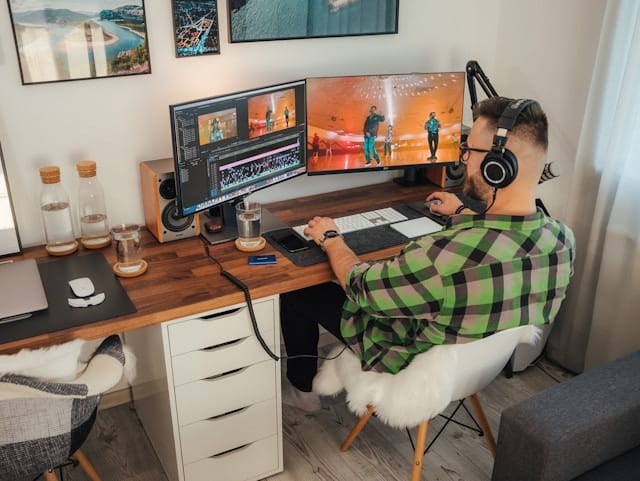How Can UK Independent Musicians Monetize Their Work Through Streaming Platforms?

In an era where digital music consumption dominates the music landscape, independent artists are seeking ways to cash in on this trend. Gone are the days when musicians’ dreams were limited to securing a record deal. Today, the rise of online platforms like Spotify offers artists the opportunity to earn revenue from their work. But how can independent artists in the UK take advantage of these platforms to monetize their talent? This comprehensive guide will walk you through the strategies that can help you maximize income from music streaming platforms.
Understanding Music Streaming Platforms
Before we delve into the nitty-gritty of music monetization, it’s essential to understand what music streaming platforms are and how they work. These platforms are online services that allow users to listen to music. They work on a ‘streaming’ basis, where music is sent in a continuous stream of data and is played as it arrives.
A découvrir également : How to Enhance Remote Learning Experiences for UK Higher Education Students?
While traditional models of music distribution focused on physical sales, the advent of the internet has propelled the music industry into a new era. The shift from physical to digital has been dramatic, with digital sales now accounting for the majority of industry revenue. Online streaming services like Spotify, Apple Music, and Tidal have become key players in this digital revolution.
Understanding how these platforms work and the role they play in the music industry is pivotal for independent artists looking to break into the market. It’s no longer just about making good music; you need to know how to navigate the digital landscape to maximize your earnings.
Sujet a lire : What Strategies Can UK Hotels Adopt to Enhance Digital Customer Service?
Streaming Platforms and Artist Royalties
The primary way artists earn money from streaming platforms is through royalties. These are payments made to copyright holders for the use of their intellectual property. In the music industry, royalties are typically paid to artists and songwriters when their music is played or performed.
However, the royalty system within streaming services can be complex and confusing, particularly for independent artists. Each platform has its own method of calculating royalties, which can vary depending on the artist’s popularity, their contract terms with the platform, and many other factors. However, it’s generally agreed that streaming platforms pay artists per stream of their song.
Although per-stream rates can seem small – Spotify, for instance, paid between $0.00331 and $0.00437 per stream in 2020 – they can accumulate into substantial sums for artists who achieve high stream counts. Therefore, the key to maximizing earnings from streaming platforms lies in increasing the number of your streams.
Strategies for Maximizing Streams and Revenue
Once you understand the basics of how royalties work, it’s time to strategize on how to maximize your streams and, consequently, your revenue. One effective way is by leveraging digital marketing to promote your music. Building a strong online presence can help attract more listeners to your music, increasing your streams.
Another strategy is to consistently create and release new music. Spotify’s algorithm, for example, favours artists who regularly release new content. By frequently updating your music catalog, you increase your visibility on the platform and improve your chances of being featured on playlists, which can significantly boost your stream count.
Collaborating with other artists can also help increase your streams. By working with artists who have a substantial following, you expose your music to a larger audience, increasing the potential for more streams and more revenue.
Power to Independent Artists: Control and Rights
What sets streaming platforms apart is that they offer independent artists control over their work and rights. Traditionally, signing with a record label often meant surrendering a significant portion of your rights and royalties. But with streaming platforms, independent artists can retain their rights and have more control over their music.
Moreover, platforms like Spotify provide comprehensive analytics to their creators. These insights can inform your marketing strategies, help you understand your audience better, and guide your creative decisions towards more successful outcomes.
A Word on the Future of Streaming
The music industry is continually evolving, and streaming platforms are at the forefront of this change. Recent trends suggest a progressive shift towards user-centric payment systems, which will likely benefit independent artists. These systems aim to distribute royalties based on individual listener behaviour, ensuring that the money subscribers pay goes directly to the artists they listen to most.
While it’s uncertain exactly how the future will unfold, one thing is clear: streaming platforms present an immense opportunity for independent artists to monetize their work. Through understanding and effectively leveraging these platforms, independent musicians in the UK can carve out a successful career in the digital music industry.
The Role of Social Media in Music Streaming
One cannot discuss the strategies for maximizing streams and revenue without highlighting the role of social media. Social media has become an indispensable tool for independent artists seeking to increase their visibility and fan base. Platforms such as Instagram, Facebook, and Twitter, among others, offer artists a direct line of communication with their fans, which can drive engagement and, subsequently, streams.
The power of social media in the music industry lies in its ability to break down barriers between artists and fans. This direct interaction helps create a loyal fan base that will support the artist by streaming their songs, attending their concerts, and buying their merchandise. Furthermore, social media platforms have features tailored to promote music, like Instagram’s music sticker and TikTok’s trending soundtracks.
For independent artists, utilizing social media is not just about posting regular updates. It’s about creating a compelling narrative around their music that resonates with their audience. This could involve sharing behind-the-scenes footage, discussing the inspiration behind their songs, or even engaging in live Q&A sessions. By doing so, artists can cultivate a dedicated fanbase that will increase their stream count and, consequently, their revenue.
Monetizing Music Beyond Streaming
While streaming platforms provide a revenue stream for independent artists, it is crucial not to overlook other ways of monetizing their work. Merchandise sales, live performances, and music licensing are all viable options that could significantly boost an artist’s income.
Merchandising, such as selling branded clothing or memorabilia, can be a lucrative business for independent artists. Fans are often willing to pay for merchandise as it creates a tangible connection with the artist. Similarly, live performances, whether online or offline, provide an additional revenue stream. They offer fans a unique experience that cannot be replicated through streaming.
Moreover, music licensing, which involves selling the rights to use your music in movies, TV shows, and advertisements, can be a significant income source. This not only provides additional income but also exposes your music to a broader audience, potentially leading to increased streams.
Conclusion: The Future is Bright for Independent Artists
In conclusion, the digital revolution in the music industry has opened up numerous opportunities for independent artists in the UK and beyond. With a sound understanding of music streaming platforms, effective utilization of social media, and exploration of other revenue streams, artists can successfully monetize their work and carve out a prosperous career.
While the journey might be challenging, the rewards can be significant. The power is now in the hands of the artists, and with the right strategies, they can take their music to unprecedented heights. The future is bright for independent artists, and streaming platforms are leading the way.
